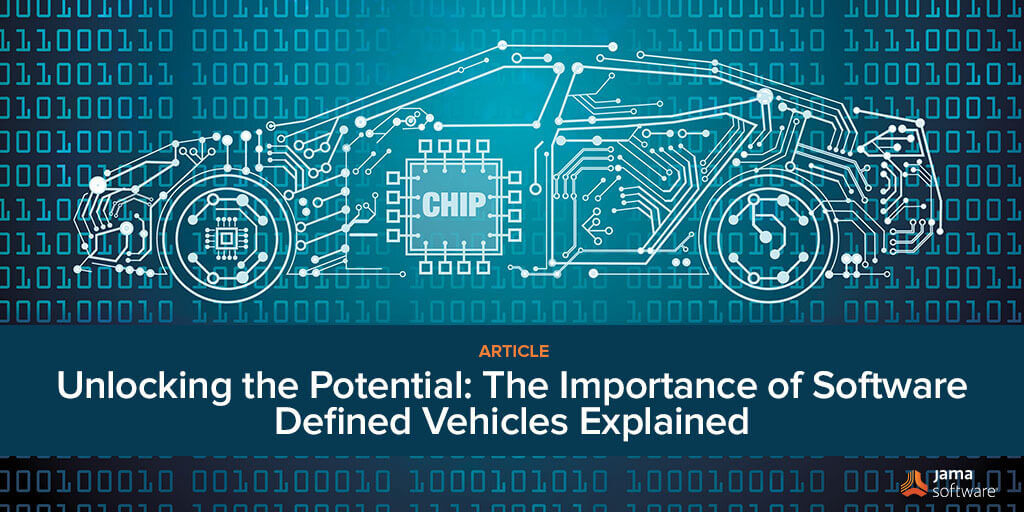
Unlocking the Potential: The Importance of Software Defined Vehicles Explained
Introduction
The automotive industry is undergoing a massive transformation, driven by technology. One of the most exciting developments is the concept of Software Defined Vehicles (SDVs). In this blog post, we will explore the importance of SDVs and how they are revolutionizing the automotive landscape.
What is a Software Defined Vehicle?
Software Defined Vehicles are automobiles that rely on software and data to control major functions, such as propulsion, safety systems, and entertainment features.
Unlike traditional vehicles, which heavily rely on hardware, SDVs leverage advanced software algorithms and connectivity to enhance performance, functionality, and user experience.
RELATED: Effectively Managing Cybersecurity in Jama Connect® for Automotive and Semiconductor Industries
Benefits of Software Defined Vehicles
1. Flexibility and Customization
SDVs offer tremendous flexibility and customization options. Software updates can be deployed remotely, allowing manufacturers to introduce new features or improve existing ones without physical modifications. This not only enhances the vehicle’s performance but also enables personalization according to user preferences.
2. Enhanced Safety and Autonomous Capabilities
SDVs play a crucial role in advancing vehicle safety and autonomy. With software-controlled systems, real-time data can be processed and analyzed more efficiently, enabling the vehicle to make instant decisions and react to various scenarios. From adaptive cruise control to automated emergency braking, SDVs are paving the way for a safer and more autonomous driving experience.
3. Improved User Experience
Software Defined Vehicles provide a seamless and intuitive user experience. Smart infotainment systems, integrated navigation, and connectivity features ensure drivers stay connected and informed on the road. Additionally, software updates can optimize vehicle performance and functionality, ensuring a consistently delightful driving experience throughout the ownership period.
4. Enhanced Sustainability
SDVs contribute to sustainability efforts in multiple ways. By optimizing energy consumption, software algorithms can improve fuel efficiency or increase the range of electric vehicles. Moreover, SDVs enable over-the-air updates, reducing the need for physical recalls and reducing waste associated with hardware replacements.
Challenges and Considerations
1. Cybersecurity
With increasing connectivity and reliance on software, cybersecurity becomes a critical concern. As Software Defined Vehicles become more commonplace, manufacturers and developers need to prioritize security measures to protect vehicles from hacking and unauthorized access.
2. Data Privacy
The extensive use of software in SDVs generates vast amounts of data. It’s crucial to develop robust privacy frameworks to ensure the responsible collection, storage, and use of data, protecting user privacy rights.
3. Regulatory Framework
The emergence of Software Defined Vehicles raises questions about legal and regulatory frameworks. Governments and authorities need to adapt and establish comprehensive regulations to ensure safe and responsible integration of SDVs into existing transportation systems.
RELATED: Buyer’s Guide: Selecting a Requirements Management and Traceability Solution for Automotive
Conclusion
Software Defined Vehicles represent a paradigm shift in the automotive industry. By harnessing the power of software and connectivity, SDVs offer unparalleled flexibility, improved safety, enhanced user experience, and sustainability benefits.
However, to fully unlock the potential of SDVs, we must address challenges related to cybersecurity, data privacy, and regulatory frameworks. Embracing this transformative technology will lead us into a future of smarter, safer, and more efficient transportation.
Note: This article was drafted with the aid of AI. Additional content, edits for accuracy, and industry expertise by Matt Mickle, McKenzie Jonsson, and Decoteau Wilkerson.
Stay tuned to our blog for future software defined vehicles content, including more in-depth explanations of how to adapt to these key challenges.
Stay tuned to our blog for future software defined vehicles content, including more in-depth explanations of how to adapt to these key challenges.
- 9 Strategies To Overcome Challenges In The EU Medical Device Market In 2025 And Beyond - February 6, 2025
- Leveraging Jama Connect® and Jira for Enhanced Requirements - January 30, 2025
- With Hacks on the Rise, Manufacturers Hone Their Cybersecurity Smarts - January 23, 2025